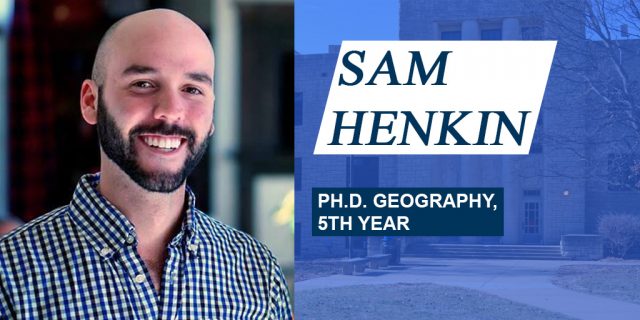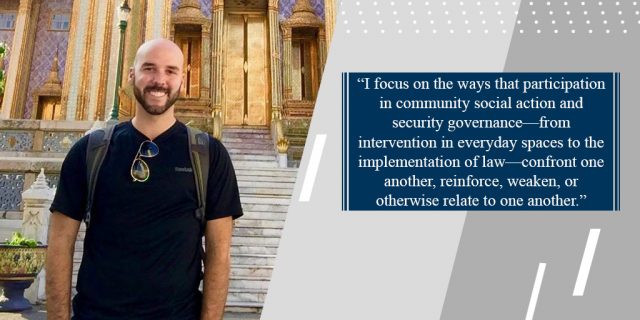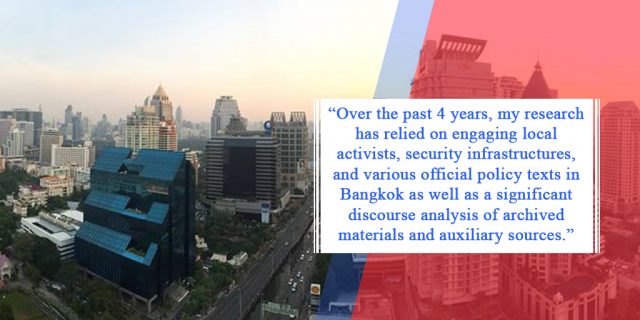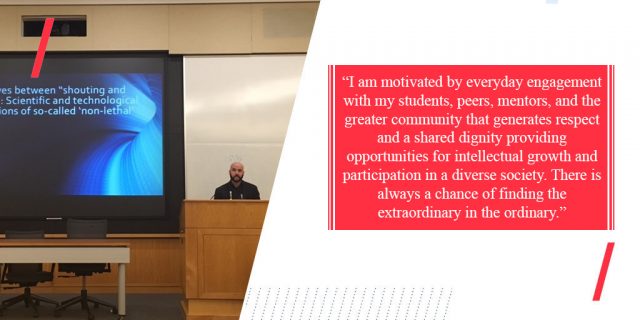
What are your research interests and why did you choose them? Was there a moment when you decided this is what you wanted to study? What was that journey like?
My research of state power and security governance has drawn considerable attention to the political and spatial dynamics of social movements, demonstrations, and everyday mobilities whereby public spaces become contested spaces. I am interested in exploring theoretical questions related to how technology, violence, and power intersect in these spaces, how the state is endowed with legitimacy to pursue violent security practices to stabilize social and political order, and how these practices impact direct community action and its possibilities. I focus on the ways that participation in community social action and security governance—from intervention in everyday spaces to the implementation of law—confront one another, reinforce, weaken, or otherwise relate to one another.

I like to think that I did not choose my research, instead my research chose me. At a time when social movements are spreading across the globe understanding why and how people engage in collective action in contested public spaces has become ever more vital. I was drawn to the activism emanating out of places like Ferguson, Missouri and Bangkok, Thailand. The all-too-familiar images of security/police forces facing off against protestors in the streets and plazas across the world echoed battlefields of war and imprinted themselves in my consciousness. The decision to study security governance in contested space emerged from the inherently unstable, multiple, and contradictory militarized common-sense (b)ordering of public spaces that activists and everyday people chose to challenge and resist.
Tell us what your PhD thesis is in under 200 characters:
It is intensive study that seeks to understand how non-lethal weapons change the dynamics of policing contested spaces and bodies in ways that preserve the legitimacy of state power and violence.
What is one thing you think everyone should know about your research project or research interests? This might be a commonly held belief that your research questions or complicates.
My research broadly connects everyday experiences to larger systems of privilege, knowledge, and power that produce uneven social and spatial relations. At its core, it confronts and disrupts dominating power relations that sustain systems of oppressions and amplifies legacies of injustice. Rooted in possibility, I draw on critical concepts of liberation, justice, and anti-violence to imagine alternative futures addressing spatial politics and social justice.
Where are you conducting your research?
As a geographer, I am inclined to conduct my research “in the field”. I spent a significant amount of time in Bangkok, Thailand while there was growing political instability that led to a noticeable increase in security forces deployment across the city. It was indicative of the forthcoming political crises that led millions of Thai people into the streets in mass demonstrations. Over the past 4 years, my research has relied on engaging local activists, security infrastructures, and various official policy texts in Bangkok as well as a significant discourse analysis of archived materials and auxiliary sources.

What advice would you give students applying for research funding opportunities?
Remember that your worth and intellectual growth lies far beyond the rejections you will receive. Do not allow rejection to become the center of your research agenda as it will create an even more insidious effect—imposter syndrome. Acknowledge rejection but do not accept it as enduring, embrace resiliency and work around rejection. Your moment (and funding) will come!
Give a shout-out to a professor, mentor, advisor, or someone at KU who has helped you?
The productive capacities of mentorship in my graduate experience cannot be overestimated. Without the invaluable counsel and guidance of my advisor, Dr. Shannon O’Lear, I would not be on the path I am today.
What do you plan to do after you graduate from KU?
Rather than focus on what “I plan to do” I focus on what I hope to achieve after graduating from KU. I hope to achieve a life defined by my commitments to democratize knowledge, to disrupt and undo legacies of oppression, violence, and injustice systemic in society and embodied in everyday life, and to pursue greater mindfulness, content knowledge, and empathetic understanding of the vertiginous complexities of humanity.
What motivates you?
I am motivated by everyday engagement with my students, peers, mentors, and the greater community that generates respect and a shared dignity providing opportunities for intellectual growth and participation in a diverse society. There is always a chance of finding the extraordinary in the ordinary.

Be like Sam. Seek out opportunities that pique your interest in your respective field and look for ways to apply and expand your knowledge. For more information about the KU Department of Geography, visit their web page and learn more about the opportunities they offer to students.